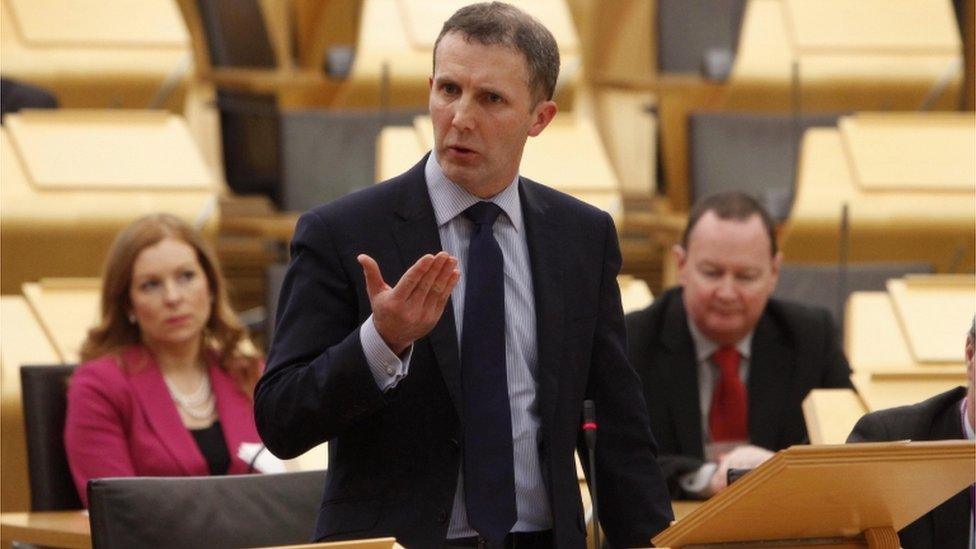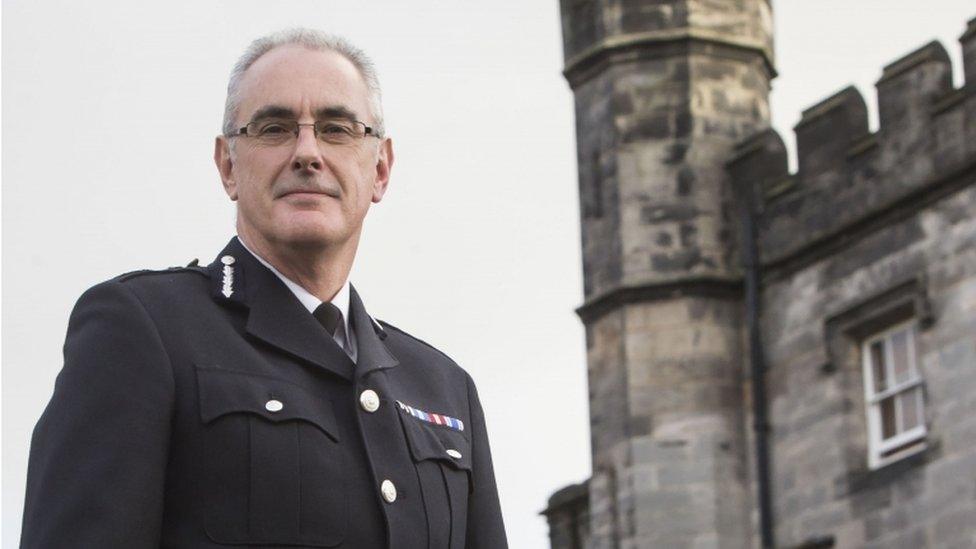No minutes of meeting on Gormley's future
- Published

Mr Matheson denies exceeding his authority by blocking Mr Gormley's return to work in November
No minutes were taken during a meeting attended by Scotland's justice secretary to discuss the future of the country's chief constable.
The meeting was held between Michael Matheson and the then-head of the Scottish Police Authority (SPA) in November.
It led to the SPA reversing its decision to allow Chief Constable Phil Gormley to return to duty.
Mr Gormley's lawyers claim Mr Matheson acted unlawfully by blocking the move.
The chief constable has been on special leave since September while investigations are carried out into allegations of gross misconduct against him.
Mr Matheson insists he did not exceed his authority during the meeting with the operationally independent SPA, and that his concerns were purely over the processes that were followed rather than the decision itself.
In an interview on the BBC's Good Morning Scotland programme on Thursday, he said would be "happy" for any minutes or other record of the meeting to be made public.
He confirmed that there were civil servants present during the course of the meeting.
But he indicated that he did not know whether any minutes had been taken, and said he would need to check with officials.
A spokesman for the Scottish government later confirmed to BBC Scotland that no minutes had been taken - meaning there was no official record of what was said during the meeting.
He said: "No minute of the meeting was produced. However, senior officials were present and communicated the conclusions of the meeting to relevant colleagues."
'Monumental importance'
The Scottish Conservatives claimed that the "immediate suspicion of the public will be that the SNP government has something to hide".
The party's justice spokesman, Liam Kerr, said: "By failing to take minutes in relation to such an important decision, Michael Matheson has only made this situation worse.
"This was a meeting of monumental importance, and failure to record the information properly is unacceptable."
Scottish Labour called for a "proper explanation" as to why there was no recording of the meeting.

Mr Matheson told MSPs on Wednesday that he only discovered on 9 November that the SPA had unanimously decided at a private meeting two days earlier to allow Mr Gormley, who denies the allegations against him, to return to duty.
He said he held a meeting to seek assurances from then-SPA chairman Andrew Flanagan that the board had followed due process in the decision, but that Mr Flanagan had been unable to give that assurance.
The decision to allow Mr Gormley to return to work was reversed the following day, after Mr Matheson said he had asked Mr Flanagan to "reconsider these matters because the process they have to have in place is one ministers have to have confidence in".
'No objection'
Mr Matheson has insisted that could work with Mr Gormley again if the chief constable returned to his post.
He told BBC Scotland: "If the Scottish Police Authority decide that they wish the chief constable to return to work, and they have a very clear, defendable, robust process in place in making that decision, I will have no objection to that whatsoever.
"This is an ongoing investigation and in my view I would like to see it taken forward as quickly as possible to allow all of this issue to be resolved as early as possible."
Mr Gormley's lawyers claim there was no lawful basis for Mr Matheson's "intervention or interference" with the SPA's decision to allow the chief constable to return to work, but Mr Matheson denies that he exceeded his authority.
The justice secretary insists that his concerns were purely over the procedures followed by the SPA rather than the decision itself, saying that the SPA had failed to inform Police Scotland's senior command team and the independent Police Investigations and Review Commissioner (Pirc).
And he has highlighted his "particular concern" about the potential impact of Mr Gormley's return to work to those who had made complaints about him.
Mr Matheson said: "I accept public bodies don't always get these things right and it is appropriate that, where ministers are aware of that, they take appropriate measures in order to address it."
Mr Matheson's predecessor as justice secretary, Kenny MacAskill, has said that Mr Gormley should leave his post even if he is cleared of the allegations against him.
Writing in the i newspaper, Mr MacAskill praised Mr Matheson's intervention, and said the chief constable cannot be allowed to "hang around" Police Scotland's headquarters at Tulliallan "like a bad smell".
Mr Matheson said Mr MacAskill was "perfectly entitled to his own opinion, and I respect that".